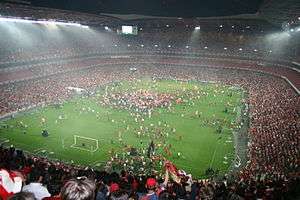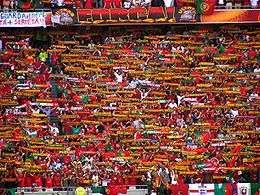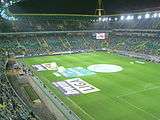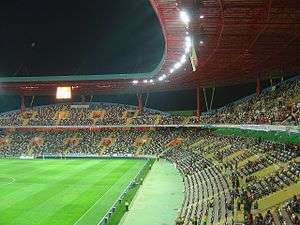Football in Portugal
| Football in Portugal | |
|---|---|
 Football fans at the Estádio da Luz | |
| Country | Portugal |
| Governing body | Portuguese Football Federation |
| National team(s) | men's national team |
National competitions | |
Club competitions | |
International competitions | |
|
Champions League Europa League Super Cup FIFA Club World Cup FIFA World Cup (national team) European Championship (national team) | |
Association football (Portuguese: futebol), the most popular sport in Portugal, has a long and storied history in the country, following its 1875 introduction in cities such as Funchal, Lisbon, Porto and Coimbra by English merchants and Portuguese students arriving back home from studying in England. This led to the establishment of local clubs dedicated to the practice of the sport.
Initially, football was played between neighbour clubs, but soon enough city wide and regional tournaments started to take place around the nation. Soon after the start of the 20th century, the need to establish which club was the best in Portugal culminated with the organizing of the "Campeonato de Portugal" (now known as "Taça de Portugal"), with subsequent bragging rights going mostly to clubs from Lisbon and Porto.
Portugal's top domestic league, the Primeira Liga, was founded in 1934 and is home to internationally successful clubs such as S.L. Benfica, FC Porto and Sporting CP – the "Big Three", who usually dominate the league. With a combined eleven trophies won to date, the measure of success by Portuguese clubs in international competition is as follows: four European Cup/UEFA Champions League, two UEFA Cup/UEFA Europa League, one European Cup Winners' Cup, one UEFA Intertoto Cup, one UEFA Super Cup and two Intercontinental Cup/Toyota Cup.
Football has been the most popular sport in Portugal for many decades. As an example, in the 2011–12 Primeira Liga season, Benfica had an average attendance of 38,029, Porto 34,843, and Sporting 30,638, with the season overall having an average and total attendances of 10,958 and 2,629,950 respectively.
Despite the production of footballers such as Eusébio, Luís Figo and Cristiano Ronaldo (Ballon d'Or winners), the Portugal national team have been, for the most part, underachievers at international level when compared to their youth squads, who have won just about every European and world title available. In FIFA World Cup, Portugal's best finishes were third in 1966 and fourth in 2006. More recently, Portugal won their first major title, the UEFA Euro 2016, over hosts France. Until then, Portugal had been runners-up to Greece as hosts in 2004, and semifinalists in 1984, 2000 and 2012.
History
Football started to gain popularity in Portugal in the late 19th century, brought by Portuguese students who returned from England.[1]
The first organized game in the country took place in 1875 in Camacha, Madeira, organized by Madeira-born Harry Hinton, who brought a football from England where he was studying. Popularity quickly spread across the island. Harry would go on to become honorary president of C.S. Marítimo.[2] [3]
The person responsible for its spread in mainland Portugal was Guilherme Pinto Basto (according to some people, his brothers Eduardo and Frederico brought the ball from England). He organized an exhibition in October 1888 and a match in January 1889. The match, played where today's Campo Pequeno bullring is located, involved opposing teams from Portugal and England. Portugal won the match 2–1. Consequently, football started attracting the attention of high society, distinguished by the Luso-British rivalry.
The game reached colleges and led to clubs across the country. By century's end, associations such as Clube Lisbonense, Carcavelos Sport Club, Braço de Prata, Real Ginásio Clube Português, Estrela Futebol Clube, Futebol Académico, Campo de Ourique, Oporto Cricket, and Sport Clube Vianense had been founded.
The first domestic match, between Lisbon and Porto, took place in 1894, attended by King Carlos.
Clube Internacional de Futebol (founded in 1902) was the first Portuguese club to play abroad, defeating Madrid Fútbol Clube in 1907 in Madrid.
On 31 March 1914, the three regional associations that existed in Portugal (Lisbon, Portalegre and Porto) merged to create a national association called a União Portuguesa de Futebol, the predecessor of the current national association, the Portuguese Football Federation, which was formed on 28 May 1926.
The Portuguese enthusiasm for football led to the spread of the sport into its former overseas colonies of Angola, Mozambique, Guiné-Bissau, Cape Verde, S. Tomé and Principe, Goa, Macau and East-Timor. Many top players from the former colonies have represented Portugal at international level, as well as playing for many clubs in the various tiers of the national and international leagues, most notably in the past the likes of Fernando Peyroteo, Matateu, Hilário, Costa Pereira, Coluna, Eusébio and Abel Xavier.
Club football
The main domestic football competition is the Primeira Liga. The dominant teams are S.L. Benfica, FC Porto and Sporting CP.
Some of the oldest clubs still in existence are Académica de Coimbra, which was founded in 1876 and Naval 1° de Maio of Figueira da Foz founded in 1893. Other historical and notable clubs are F.C. Porto, after an unsuccessful attempt in 1893 (the current foundation date), reappeared in 1906. Boavista F.C. was founded in 1903. S.L. Benfica was born as the result of the fusion in 1908 between Sport Lisboa, founded in 1904, and Grupo Sport Benfica, founded in 1906; the club maintained the foundation date of Sport Lisboa. Sporting CP was founded in 1906. Leixões S.C. founded in 1907, Vitória F.C. of Setúbal plus C.S. Marítimo and C.D. Nacional both of Madeira all founded in 1910, S.C. Olhanense in 1912, S.C. Espinho, Portimonense S.C. and Académico de Viseu F.C. all founded in 1914, C.F. Os Belenenses was founded in 1919. The success of these earlier clubs inspired the rapid spread of football to all corners of Portugal. After the end of World War I, the sprouting of football clubs all over the country gained momentum and in the 1920s S.C. Braga, Guimarães, Gil Vicente and S.C. Beira Mar among many others where founded, further asserting the popularity of the sport where ever it was played with stadiums filled to maximum capacity. By then, the local talent wanting to always better the opposition, further improved the quality of the players training and tactical strategy awareness by investing and importing top foreign coaching and managerial staff from abroad, resulting in the refinement and improvement of the local game quality being able to stand up to top international levels. Some early clubs from the late 1800s and early 1900s, like Carcavelinhos, for example, did not survive and either merged with other clubs or become extinct altogether.
At European level, before the advent of UEFA sanctioned competitions, such as the European Cup, the Inter-Cities Fairs Cup and the European Cup Winners' Cup/UEFA Cup Winners' Cup, which became regular scheduled competitions, Benfica won the now defunct Latin Cup, a competition organized annually by the football associations of France, Italy, Portugal, and Spain, from the late 1940s to the mid 1950s, involving those nation's top teams.
List of teams (2015–16 season)
| Conventional name | UEFA short name | Official name | Location |
|---|---|---|---|
| Académica de Coimbra | A.Académica de Coimbra | Associação Académica de Coimbra | Coimbra |
| Arouca | FC Arouca | Futebol Clube de Arouca | Arouca |
| Belenenses | CF Os Belenenses | Clube de Futebol Os Belenenses | Lisbon |
| Benfica | S.L. Benfica | Sport Lisboa e Benfica | Lisbon |
| Boavista | Boavista F.C. | Boavista Futebol Clube | Porto |
| Braga or Sporting de Braga |
S.C. Braga | Sporting Clube de Braga | Braga |
| Estoril or Estoril-Praia |
GD Estoril-Praia | Grupo Desportivo Estoril-Praia | Estoril |
| Marítimo | C.S. Marítimo | Club Sport Marítimo | Funchal, Madeira |
| Moreirense | Moreirense FC | Moreirense Futebol Clube | Moreira de Cónegos |
| Nacional or Nacional da Madeira |
CD Nacional | Clube Desportivo Nacional | Funchal, Madeira |
| Paços de Ferreira | F.C. Paços de Ferreira | Futebol Clube Paços de Ferreira | Paços de Ferreira |
| Porto | FC Porto | Futebol Clube do Porto | Porto |
| Rio Ave | Rio Ave F.C. | Rio Ave Futebol Clube | Vila do Conde |
| Sporting CP | Sporting Clube de Portugal |
Sporting Clube de Portugal | Lisbon |
| Tondela | CD Tondela | Clube Desportivo de Tondela | Tondela |
| União or União da Madeira |
CF União | Clube de Futebol União | Funchal, Madeira Islands |
| Vitória de Setúbal or Setúbal |
Vitória FC | Vitória Futebol Clube | Setúbal |
| Vitória de Guimarães or Guimarães |
Vitória SC | Vitória Sport Clube | Guimarães |
List of teams by major honours
Below is listed every team to have won any of the major domestic competitions (organized by LPFP and FPF) and international trophies (organized by UEFA and FIFA).
| Rank | Club | PL | CP | TP | TL | ST | CL | EL | UCWC | UIC | USC | IC | Total | Last honour |
|---|---|---|---|---|---|---|---|---|---|---|---|---|---|---|
| 1 | Benfica | 36 | 3 | 26 | 7 | 7 | 2 | - | - | - | - | - | 81 | 2017 Supertaça Cândido de Oliveira |
| 2 | Porto | 28 | 4 | 16 | - | 21 | 2 | 2 | - | - | 1 | 2 | 76 | 2018 Supertaça Cândido de Oliveira |
| 3 | Sporting CP | 18 | 4 | 16 | 1 | 8 | - | - | 1 | - | - | - | 48 | 2017–18 Taça da Liga |
| 4 | Boavista | 1 | - | 5 | - | 3 | - | - | - | - | - | - | 9 | 2000–01 Primeira Liga |
| 5 | Belenenses | 1 | 3 | 3 | - | - | - | - | - | - | - | - | 7 | 1988–89 Taça de Portugal |
| 6 | Vitória de Setúbal | - | - | 3 | 1 | - | - | - | - | - | - | - | 4 | 2007–08 Taça da Liga |
| 6 | Braga | - | - | 2 | 1 | - | - | - | - | 1 | - | - | 4 | 2015–16 Taça de Portugal |
| 8 | Académica | - | - | 2 | - | - | - | - | - | - | - | - | 2 | 2011–12 Taça de Portugal |
| 8 | Vitória de Guimarães | - | - | 1 | - | 1 | - | - | - | - | - | - | 2 | 2012–13 Taça de Portugal |
| 10 | Olhanense | - | 1 | - | - | - | - | - | - | - | - | - | 1 | 1923–24 Campeonato de Portugal |
| 10 | Marítimo | - | 1 | - | - | - | - | - | - | - | - | - | 1 | 1925–26 Campeonato de Portugal |
| 10 | Carcavelinhos[5] | - | 1 | - | - | - | - | - | - | - | - | - | 1 | 1927–28 Campeonato de Portugal |
| 10 | Leixões | - | - | 1 | - | - | - | - | - | - | - | - | 1 | 1960–61 Taça de Portugal |
| 10 | Estrela da Amadora | - | - | 1 | - | - | - | - | - | - | - | - | 1 | 1989–90 Taça de Portugal |
| 10 | Beira-Mar | - | - | 1 | - | - | - | - | - | - | - | - | 1 | 1998–99 Taça de Portugal |
| 10 | Aves | - | - | 1 | - | - | - | - | - | - | - | - | 1 | 2017–18 Taça de Portugal |
| 10 | Moreirense | - | - | - | 1 | - | - | - | - | - | - | - | 1 | 2016–17 Taça da Liga |
|
National competitions:
|
European competitions:
|
Worldwide competitions:
|
National team

On 26 May 2010, Portugal attained the third place in the FIFA World Ranking, their highest ever. Their lowest rank was 43rd overall in 1998. In recent years, Portugal has consistently maintained a top 10 and, sometimes, a top 5 FIFA world rank position.
In 2004 Portugal hosted UEFA Euro and reached its final but were beaten by Greece 1–0. In worldwide terms, Portugal have reached the semi-finals of the FIFA World Cup twice: in the 1966 edition, where Eusébio was the top scorer with nine goals, and in the 2006 edition, where the team led by captain Luís Figo marked the World Cup debut of Cristiano Ronaldo.
Following the retirement of all players from its "golden generation", Portugal, led by manager Fernando Santos, won Euro 2016, defeating hosts France 1–0 in the final.[7]

Capacity: 65,647
.jpg)
Capacity: 50,948

Capacity: 50,466
Capacity: 37,593

Capacity: 30,498
Portugal also participates to the Lusophony Games and takes part in its football tournaments. In 2014, Portugal was one of the eight nations to take part in the first Unity World Cup.
References
- ↑ Football Bible. "Portuguese football | Portugal soccer league, clubs, players, history". Football-bible.com. Retrieved 2017-03-23.
- ↑ "Archived copy". Archived from the original on 2012-01-14. Retrieved 2013-05-24.
- ↑ "Camacha". Madeira-web.com. 2010-12-17. Retrieved 2017-03-23.
- ↑
- ↑ Carcavelinhos is an extinct club. It merged with União de Lisboa in 1942, resulting in Atlético de Portugal.
- ↑ From 1922 to 1938, the Portuguese champion was determined in a knock-out competition called Campeonato de Portugal (Championship of Portugal).
- ↑ "Portugal 1-0 France (AET)". BBC. 11 July 2016. Retrieved 23 March 2017.